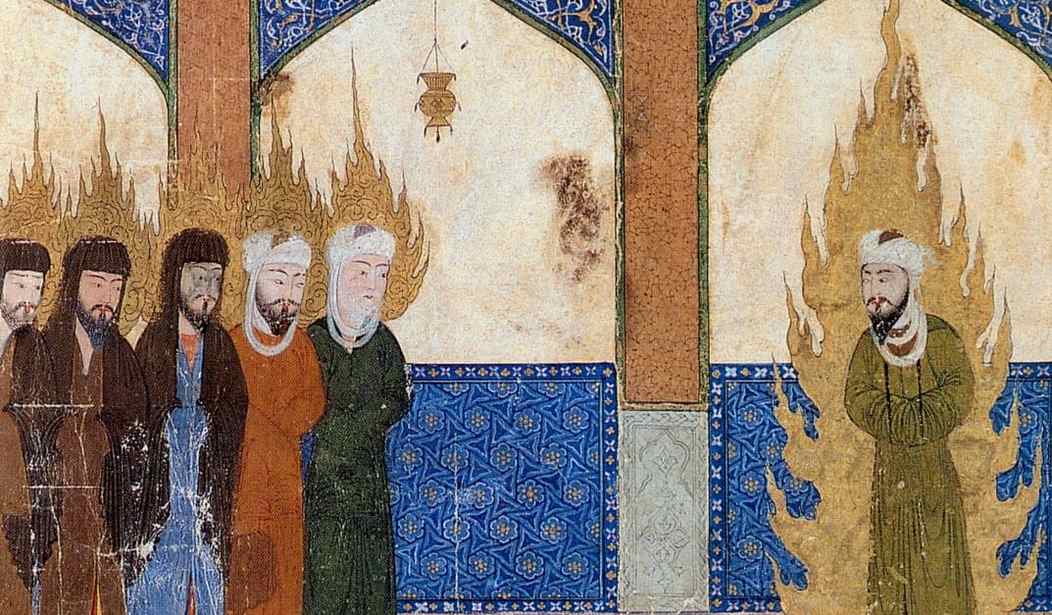Any honest and objective appraisal of Islam’s historic jihad on the Christian world must be eye-opening, to say the very least. In the first century of its existence (between 632-732) Islam permanently conquered, Arabized, and Islamized nearly three-quarters of the post-Roman Christian world, thereby permanently severing it. Europe came to be known as “the West” because it was literally the remaining and westernmost appendage of Christendom not to be swallowed up by Islam.
For roughly a millennium thereafter, Arabs, Berbers, Turks, and Tatars—all of whom called and saw themselves as Muslims—launched raid after raid, all justified and lauded as jihads, into virtually every corner of Europe. They reached as far as Iceland and provoked the U.S. into its first war as a nation. The devastation was indescribable; some regions in Europe, particularly in Spain and the Balkans, remain inhabitable due to the incessant raiding. Some 15 million Europeans were enslaved during this perennial jihad and, according to contemporary records, treated horrifically.
In short, “if we … ask ourselves how and when the modern notion of Europe and the European identity was born,” writes historian Franco Cardini, “we realize the extent to which Islam was a factor (albeit a negative one) in its creation. Repeated Muslim aggression against Europe between the seventh to eighth centuries, then between the fourteenth and the eighteenth centuries … was a ‘violent midwife’ to Europe.”
Here the inevitable question arises: How could such a long, well-documented history of unmitigated Islamic aggression that had immense repercussions on the development of Western civilization now be presented as the antithesis of reality?
The answer revolves around a number of modern philosophies—from the Enlightenment to moral/cultural relativism—that have each contributed to an all-pervasive “Narrative” concerning the historic relationship between Islam and the West. In presenting the West as aggressor and Islam as victim—hence the latter’s ongoing “grievance”-based animosity—this history is as entrenched as it is the reverse of reality.
To understand this, one must first understand that, despite its many manifestations, permutations, and emphases over the centuries, the Narrative’s unspoken driving force has largely been the same: to demonize and thus justify a break away from Europe’s traditional heritage, religion, identity, and mores. If this sounds farfetched, consider: whereas by any objective standard the West is responsible for practically every boon taken for granted today—from scientific, technological, economic and medicinal advances, to the abolition of slavery and anti-discrimination laws—today no people of any race or civilization despise their heritage except Western people. Clearly something is amiss.
Or consider how leftists/liberals/progressives, who forever whine against any vestige of Western traditionalism, habitually make common cause with Islam—despite the latter’s truly oppressive qualities. Thus feminists denounce the Western “patriarchy”—but say nothing against the Muslim treatment of women as chattel; homosexuals denounce Christian bakeries—but say nothing against the Muslim execution of homosexuals; multiculturalists denounce Christians who refuse to suppress their faith to accommodate the religious sensibilities of Muslim minorities—but say nothing against the entrenched and open Muslim persecution of Christians.
The reason for these discrepancies is simple: “The enemy [Islam] of my enemy [Christianity] is my friend.”
From here, how and why such a formally well-known history of Muslim aggression against Europe was not merely suppressed but reversed should start making sense: of all non-European, non-Christian peoples, only Muslims lived alongside and interacted with (that is, constantly encroached and warred on) Europe for over a millennium; this made Muslims the only people—the only foil—that could be used to support the Narrative’s argument against premodern Europe. But first, an intellectually satisfying way of casting Muslims as victims not conquerors was needed.
Enter literary professor Edward Said’s 1978 book, Orientalism. Its central thesis is that the Orientalists—the Europeans who began the academic study of the East centuries ago—were not writing objectively about Muslims and their history, but rather intentionally slandering and stereotyping them in order to justify dominating them during the colonial era.
This made perfect sense—but only because the postmodern Western mind had already been primed for it. For if, as Marxist Materialism teaches, ideas/religions have no influence on history (and thus, economic want, not “jihad,” caused Muslims to expand); if, as Relativism and its spawn Multiculturalism teach, there are no absolute truths, religious or otherwise (and thus no culture or civilization is “better” than another); if, as pop psychology teaches, violent and negative behavior is always a product of societal injustices (and thus the more Muslims behave violently, the more that only proves they are frustrated victims)—then what does one make of the aforementioned centuries of European writings that uniformly depict Muslims as ideologically driven by violence and lust?
Simple: dismiss them all as bigoted and hypocritical lies by nefarious Christians and Europeans intent on demonizing a superior, more tolerant faith and civilization. Thus a whole new academic approach to Islam—stripped of all historic writings not conforming to the Narrative—was born. History would no longer shape ideas and attitudes; rather, preexisting ideas and attitudes—wishful thinking—would shape history.
Bernard Lewis, himself a target of Edward Said’s Orientalism, summarized this new approach—or “pseudo-history”—well:
According to a currently fashionable epistemological view, absolute truth is either nonexistent or unattainable. Therefore, truth doesn’t matter; facts don’t matter. All discourse is a manifestation of a power relationship, and all knowledge is slanted. Therefore, accuracy doesn’t matter; evidence doesn’t matter. All that matters is the attitude—the motives and purposes—of the user of knowledge, and this may simply be claimed for oneself or imputed to another. In imputing motives, the irrelevance of truth, facts, evidence, and even plausibility is a great help. The mere assertion suffices” (Islam and the West, 115).
Orientalism’s success lay less in anything intrinsic to it—American classicist Bruce Thornton characterizes it as an “incoherent amalgam of dubious postmodern theory, sentimental Third Worldism, glaring historical errors, and Western guilt”—and more because it fit the West’s prevailing zeitgeist (which, of course, thrives on “dubious postmodern theory, sentimental Third Worldism, glaring historical errors, and Western guilt”).
Nor does the Narrative predominate today because people are well-read or pay attention to academe; as French historian Marc Ferro demonstrated in his Cinema and History (1988), the overwhelming majority of Western people’s knowledge of history comes from movies. And almost any major film dealing with premodern Europeans and Muslims—Robin Hood (1991), Kingdom of Heaven (2005), etc.—contrasts hypocritical, intolerant, and fanatical Christians with sophisticated, advanced, and tolerant Muslims. Commenting on such films back in 1997, Lewis wrote, “The misrepresentation of the past in the cinema is probably the most fertile and effective source of such misinformation at the present time…”
Twenty years later the Narrative has only metastasized and infected all aspects of public life, including politics and so-called “mainstream news.” Meanwhile, social and other media giants—YouTube, Google, Facebook, Twitter—increasingly censor material that contradicts the Narrative.
Such is how a previously well-known history was turned upside down and used to weaken the West—the greatest sin of which is ever again to think or behave like its “awful” ancestors did concerning Islam.
For more on the true history between Islam and the West, see the author’s recent Sword and Scimitar: Fourteen Centuries of War between Islam and the West.










Join the conversation as a VIP Member